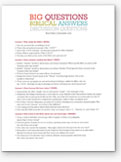
Many of the concepts encircling the globe today are opposed to God’s Word. Worldviews give birth to ideas, and the world revolves around these concepts, such as macro-evolution, jihad, infanticide, or the new tolerance. Obviously, these ideas have consequences. From a Christian worldview, sinful people produce bad ideas leading to negative consequences. This explains the reality of life as we experience it everyday. Yet Christians need to understand what others believe and why.
Nancy Pearcey writes, “Before they leave home, they should be well acquainted with all the ‘isms’ they will encounter, from Marxism to Darwinism to postmodernism. It is best for young believers to hear about these ideas first from trusted parents, pastors, and youth leaders, who can train them in strategies for analyzing competing ideologies.”
Why bother studying various worldviews? Don’t we have enough of the Bible to study? We study the Bible as well as these other worldviews because souls are at stake, as well as institutions. Christians need to make a difference; we are sent into the world with the Great Commission from Matthew 28:19-20. “‘Go and make disciples of all nations, baptizing them in the name of the Father and of the Son and of the Holy Spirit, and teaching them to obey everything I have commanded you.’” People’s lives, way of life, and eternal souls are on the line—that’s why we study what others believe. The love of Christ motivates us to talk.
Furthermore, our understanding of their worldview enhances the way we witness. As Christians we are called to be missionaries to our world, and that means learning the language and thought-forms of the people we want to reach. As discussed in an earlier blog, the best way to make a window for witnessing is by showing the conflict of what people believe but know experientially. When someone says people are basically good, you ask if they lock their door at night. They shouldn’t if people are good—what do they have to fear? When someone says we’re evolved animals, you ask if they are upset when a murder takes place. They shouldn’t be if we’re animals—creatures kill each other every day in the wild. People’s inconsistency, when their worldview points in one direction while their life experience points in another, reveals that their map doesn’t work. But you have to do your homework first and know where people are coming from.
That’s why Paul was bothered about the unbelievers in Athens and did something about it. He had done his homework and knew the worldview of the people there. In Acts 17:16-17 it says, “While Paul was waiting for them in Athens, he was greatly distressed to see that the city was full of idols. So he reasoned in the synagogue with the Jews and the God-fearing Greeks, as well as in the marketplace day by day with those who happened to be there.” Paul became distraught over these unbelievers in Athens so he reasoned with them in the synagogue and market on a daily basis. To what end? So that he might be known as the smartest man in Athens? No, Paul’s motivation for witnessing is in 1 Corinthians 9:22-23. “I have become all things to all men so that by all possible means I might save some.”
Learn how to defend your Christian Faith

Big Questions Biblical Answers Supplemental Materials
by Brad Alles
- September 2022
- August 2022
- July 2022
- June 2022
- May 2022
- April 2022
- March 2022
- February 2022
- January 2022
- December 2021
- November 2021
- October 2021
- September 2021
- August 2021
- July 2021
- June 2021
- May 2021
- April 2021
- March 2021
- February 2021
- January 2021
- December 2020
- November 2020
- October 2020
- September 2020
- August 2020
- July 2020
- June 2020
- May 2020
- April 2020
- March 2020
- February 2020
- January 2020
- December 2019
- November 2019
- October 2019
- September 2019
- August 2019
- July 2019
- June 2019
- May 2019
- April 2019
- March 2019
- February 2019
- January 2019
- December 2018
- November 2018
- October 2018
- September 2018
- August 2018
- July 2018
- June 2018
- May 2018
- April 2018
- March 2018
- February 2018
- January 2018
- December 2017
- November 2017
- October 2017
- September 2017
- August 2017
- July 2017
- June 2017
- May 2017
- April 2017
- March 2017
- February 2017
- January 2017
- December 2016
- November 2016
- October 2016
- September 2016
- August 2016
- July 2016
- June 2016
- May 2016
- April 2016
- March 2016
- February 2016
- January 2016
- December 2015
- November 2015
- October 2015
- September 2015
- August 2015
- July 2015
- May 2015
- April 2015
- March 2015
- February 2015
- January 2015
- December 2014
- November 2014
- October 2014
- September 2014
- August 2014
- July 2014
- June 2014
- May 2014
- April 2014
- March 2014
- February 2014
- January 2014
- December 2013
- November 2013
- October 2013
- September 2013
- August 2013
- July 2013
- June 2013
- May 2013
- April 2013
- March 2013
- February 2013
- January 2013
- December 2012
- November 2012
- October 2012
- September 2012
- August 2012
- July 2012
- June 2012
- May 2012
- April 2012
- March 2012
- February 2012
- January 2012














Comments are closed.